7 Ways Meditation Enhances Creativity by delving into the powerful connection between mindfulness and unlocking your creative potential. Prepare to discover the transformative impact of meditation on your creative endeavors.
As we explore the intricate relationship between meditation and creativity, you’ll uncover a world of inspiration and innovation waiting to be unleashed.
Introduction to Meditation and Creativity
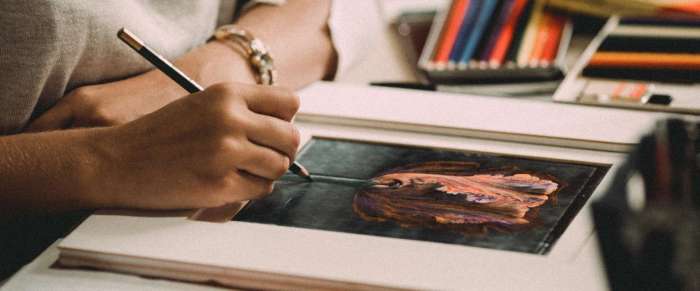
In the context of this discussion, meditation refers to a practice of focusing the mind and achieving a state of deep relaxation and awareness. On the other hand, creativity is the ability to generate new ideas, solutions, and possibilities.
There is a strong relationship between meditation practices and enhanced creativity. When we meditate, we quiet the mind, reduce stress, and tap into our inner resources. This mental clarity and heightened awareness can lead to increased creativity and innovation in various aspects of our lives.
The Importance of Creativity
- Creativity is essential in problem-solving, allowing us to think outside the box and come up with unique solutions to challenges.
- It enhances our ability to adapt to change and find innovative ways to navigate complex situations.
- Creativity fuels artistic expression, leading to the creation of new music, art, literature, and other forms of cultural production.
- In business, creativity drives innovation, helping companies develop new products, services, and strategies to stay competitive in the market.
- On a personal level, creativity brings joy and fulfillment, allowing us to explore our passions and express ourselves authentically.
Cognitive Benefits of Meditation on Creativity
Meditation has been shown to have a profound impact on cognitive functions, which in turn enhances creativity. By calming the mind and increasing focus, meditation helps individuals tap into their creative potential in various ways.
Improved Attention and Focus
- Mindfulness meditation, where individuals focus on the present moment without judgment, can help improve attention span and concentration.
- By training the mind to stay focused on a single point, meditation reduces distractions and enhances the ability to concentrate on creative tasks.
Enhanced Problem-Solving Skills
- Transcendental meditation, a technique that involves silently repeating a mantra, has been linked to improved problem-solving abilities.
- Regular practice of meditation can lead to increased cognitive flexibility, allowing individuals to approach challenges from different perspectives and come up with innovative solutions.
Reduced Stress and Anxiety
- By reducing stress and anxiety levels, meditation creates a conducive environment for creative thinking to flourish.
- When the mind is calm and relaxed, individuals are better able to access their creative insights and think outside the box.
Emotional Regulation and Inspiration
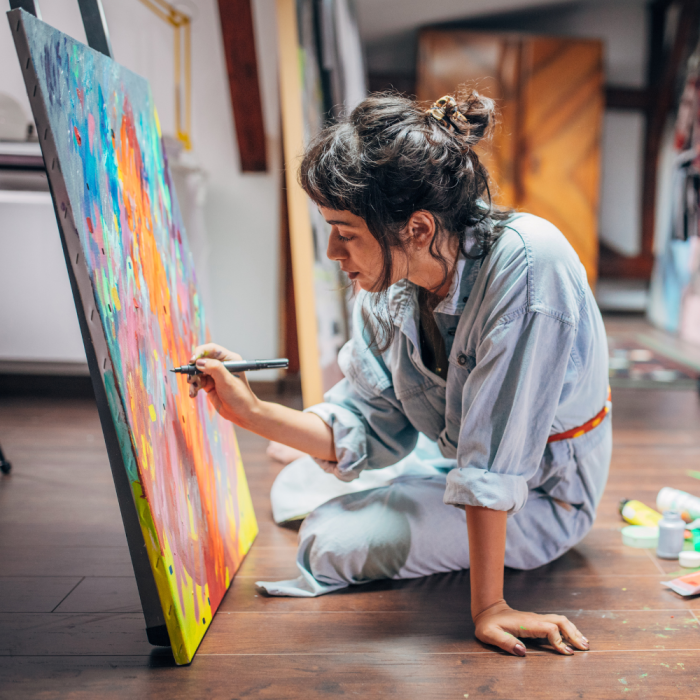
Meditation plays a significant role in emotional regulation, which is crucial for enhancing creativity. By reducing stress and anxiety, meditation creates a sense of calmness that allows for increased inspiration and innovative thinking.
Enhanced Emotional Regulation
- Meditation helps individuals become more aware of their emotions and thoughts, allowing them to regulate their responses effectively.
- Practicing mindfulness meditation can lower the levels of cortisol, the stress hormone, leading to a more balanced emotional state.
- Through meditation, individuals can develop a greater sense of self-awareness, empathy, and compassion towards themselves and others.
Inspiration and Creativity
- Many artists, writers, and creative professionals credit meditation for sparking their creativity and helping them overcome creative blocks.
- By quieting the mind and creating mental space, meditation allows for new ideas to surface and for connections to be made between seemingly unrelated concepts.
- Regular meditation practice can lead to enhanced divergent thinking, allowing individuals to generate a wide range of creative solutions to problems.
Emotional Intelligence and Creativity
- Emotional intelligence, which includes self-awareness, self-regulation, empathy, and social skills, is closely linked to creativity.
- By improving emotional intelligence through meditation, individuals can better understand their emotions and use them as a source of inspiration for their creative endeavors.
- Individuals with high emotional intelligence are more adept at managing stress, handling setbacks, and maintaining a positive outlook, all of which are essential for nurturing a creative mindset.
Enhanced Focus and Clarity through Meditation
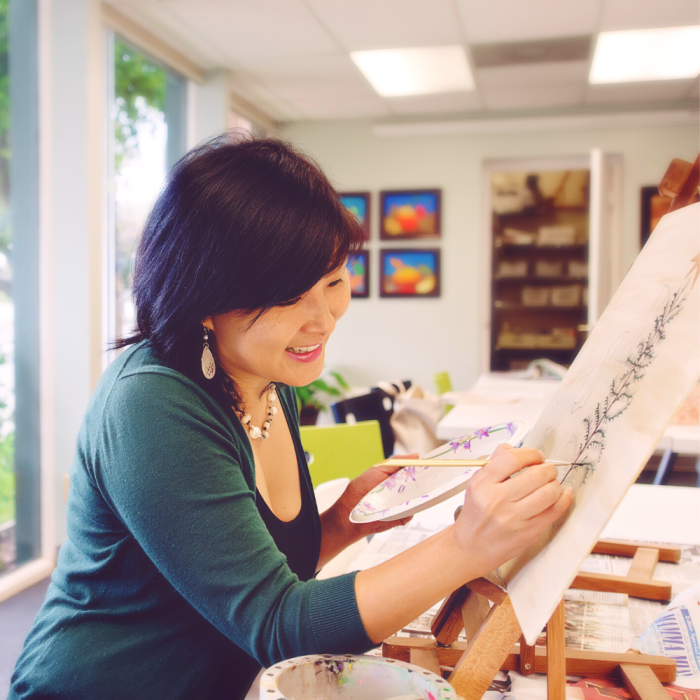
Meditation plays a crucial role in enhancing focus and clarity, which are essential for boosting creativity and problem-solving abilities. By calming the mind and reducing distractions, meditation helps individuals concentrate better on tasks at hand and think more clearly.
Tips for Clearing Mental Clutter and Enhancing Clarity
- Start with a few minutes of deep breathing to center yourself and clear your mind before diving into meditation.
- Practice mindfulness by focusing on the present moment and observing your thoughts without judgment, allowing them to pass by like clouds in the sky.
- Use visualization techniques to imagine a clutter-free space in your mind, gradually letting go of any distractions or intrusive thoughts.
- Incorporate body scan meditations to release tension and promote relaxation, creating a clearer mental space for improved focus.
Connection between Mindfulness and Creative Breakthroughs
Mindfulness, a key component of meditation, encourages individuals to be fully present and engaged in their creative process. By cultivating awareness and staying attuned to their thoughts and emotions, artists and innovators can tap into their inner resources and uncover new ideas and solutions. This heightened state of mindfulness often leads to creative breakthroughs and innovative thinking.
Heightened Awareness and Sensory Perception
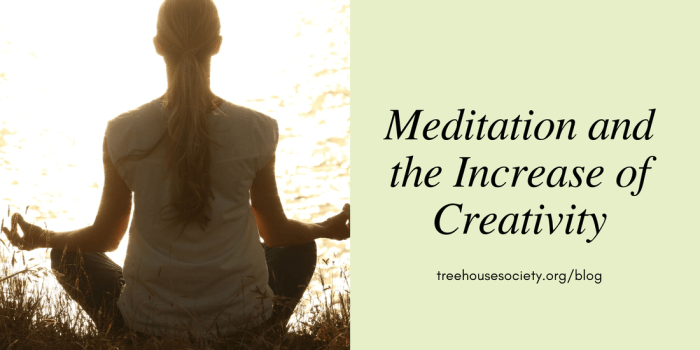
When it comes to creativity, heightened awareness and sensory perception play a crucial role in deepening the creative process. Through meditation, individuals can enhance their ability to perceive and connect with their surroundings on a deeper level, ultimately influencing their artistic expression and innovative thinking.
Enhanced Perception of Surroundings
- Meditation allows individuals to cultivate a sense of mindfulness and presence, enabling them to fully engage with their environment.
- Heightened awareness of sensory input, such as sights, sounds, and textures, can inspire new ideas and perspectives for creative projects.
- By sharpening sensory perception, individuals can notice intricate details and subtleties that might have otherwise gone unnoticed, enriching their creative work.
Impact on Artistic Expression, 7 Ways Meditation Enhances Creativity
- Increased sensory awareness can lead to a more profound connection with one’s emotions and inner experiences, translating into more authentic and impactful artistic expression.
- Artists may find new inspiration in the beauty of everyday life, drawing from their heightened perception to create intricate and meaningful works of art.
- By immersing themselves fully in the present moment, artists can channel their heightened awareness into their creative process, resulting in work that resonates deeply with audiences.
Deepening the Creative Experience
- Through mindfulness practices, individuals can cultivate a deeper sense of connection with their creative intuition, allowing for a more fluid and inspired creative process.
- Heightened sensory perception can enhance the quality of creative output, as artists become more attuned to the nuances of their craft and the world around them.
- By honing their awareness and sensory perception through meditation, individuals can access a wellspring of creativity that flows seamlessly and authentically.
Overcoming Creative Blocks with Meditation
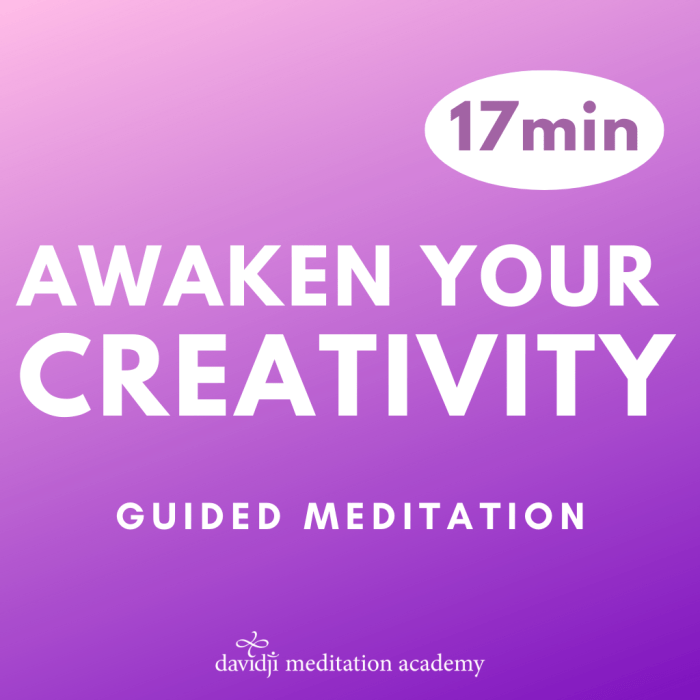
Meditation can be a powerful tool to help overcome creative blocks by quieting the mind, reducing stress, and opening up new pathways for inspiration and innovation.
Identifying Creative Blocks
- Perfectionism: Striving for perfection can often lead to creative paralysis. Meditation can help release the pressure of perfectionism and allow for more free-flowing ideas.
- Self-doubt: Doubting one’s abilities or ideas can hinder creativity. Through meditation, individuals can build self-confidence and trust in their creative instincts.
- Stress and overwhelm: Feeling overwhelmed by deadlines or pressure can block creative thinking. Meditation can help reduce stress levels and promote a sense of calmness, allowing for clearer thinking.
Using Meditation Strategies to Break Through Blocks
- Practice mindfulness meditation: By focusing on the present moment and observing thoughts without judgment, individuals can break through mental barriers and tap into their creative potential.
- Visualize creative solutions: During meditation, visualize yourself overcoming creative blocks and coming up with innovative ideas. This mental rehearsal can help boost creative problem-solving skills.
- Engage in walking meditation: Walking meditation can help stimulate creativity by allowing the mind to wander freely and make new connections. Take a mindful walk to clear your mind and invite fresh ideas.
Examples of Successful Navigation of Creative Blocks
- Author Elizabeth Gilbert, known for her book “Eat, Pray, Love,” credits meditation as a key practice in overcoming creative blocks and finding inspiration for her writing.
- Artist and filmmaker David Lynch is a vocal advocate for the benefits of meditation in enhancing creativity and breaking through mental barriers to artistic expression.
- Composer Philip Glass has integrated meditation into his creative process, using it as a tool to overcome creative blocks and access deeper levels of artistic inspiration.
Cultivating a Creative Mindset with Meditation
Meditation is not only a tool for immediate creative inspiration but also a long-term practice that can significantly enhance one’s creativity over time. By integrating meditation into daily life, individuals can cultivate a creative mindset that fosters sustained innovation and originality in their work and personal endeavors.
Benefits of Integrating Meditation for Sustained Creativity
- Mental Clarity: Regular meditation helps clear the mind of clutter and distractions, allowing creative ideas to flow more freely.
- Stress Reduction: Managing stress through meditation creates a conducive environment for creativity to thrive without the interference of negative emotions.
- Enhanced Problem-Solving Skills: Meditation improves cognitive function, enabling individuals to approach challenges with a fresh perspective and innovative solutions.
Roadmap for Incorporating Meditation Practices
- Start with Short Sessions: Begin with just a few minutes of meditation each day and gradually increase the duration as you become more comfortable with the practice.
- Consistency is Key: Establish a daily meditation routine to reap the full benefits of sustained creativity and mental clarity.
- Experiment with Different Techniques: Explore various meditation techniques such as mindfulness, loving-kindness, or visualization to find what works best for you.
Using Meditation for Continuous Creative Growth
Meditation serves as a powerful tool for continuous creative growth by fostering self-awareness, emotional regulation, and a deep connection to one’s inner creativity. As individuals delve deeper into their meditation practice, they unlock new levels of self-expression and tap into a wellspring of inspiration that fuels their creative endeavors.
Final Conclusion: 7 Ways Meditation Enhances Creativity
Embark on a journey towards heightened creativity and self-expression with the profound insights gained from integrating meditation into your daily routine. Embrace the transformative power of mindfulness to cultivate a mindset primed for endless creative possibilities.